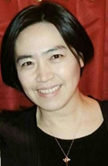Shijie Sheng
Office Address
Department of Pathology540 East Canfield Avenue
Detroit, MI 48201
Administrative Contact
Pathology Department, Brenda Batts, Phone: (313) 577-1102; KCI T&M Program, Janice Akoury, E-mail: akouryj@karmanos.orgPosition Title
Professor
Education Training
Ph.D. (1993): University of Florida College of Medicine, Gainesville, FL, USA
Postdoctoral Fellowship
1993-1997: Harvard Medical School, Dana Farber Cancer Institute, Boston, MA, USA
Areas of Interest
Prostate cancer, invasion and metastasis, drug sensitivity, tumor suppressor, and maspinResearch Interests
The Sheng laboratory investigates the underlying molecular mechanisms of prostate tumor progression, metastasis and drug sensitivity, using a full spectrum of cancer biology methodologies. Specifically, the lab studies maspin, a novel tumor suppressive serine protease inhibitor. Dr. Sheng and colleagues have shown that epithelial-specific maspin inhibits tumor invasion and metastasis, and maspin sensitizes tumor cells to drug induced apoptosis. Interestingly, maspin does not inhibit any active serine proteases. Recently, the Sheng lab identified histone deacetylase 1 (HDAC1) and pro-urokinase type plasminogen activator (pro-uPA) as the molecular targets of maspin. These breakthroughs are of potentially high impact and clinical significance. The focus of a current project in the Sheng laboratory is to study how maspin blocks pro-uPA-mediated stromal remodeling in bone microenvironment, a preferred site for prostate tumor metastasis. Another project investigates the hypothesis that by inhibiting HDACA1, maspin sensitizes tumor cells to drug-induced apoptosis while preventing adverse epithelial dedifferentiation.
Publications
- Zou Z, Anisowicz A, Hendrix MJC, Thor A, Neveu M, Sheng S, Rafidi K, Seftor E, and Sager R, Maspin, a Serpin with Tumor Suppressing Activity in Human Mammary Epithelial Cells, Science, 263: 526-529, 1994.
- Sheng S, Carey J, Seftor E, Dias L, Hendrix MJC, and Sager R, Maspin Acts on the Cell Membrane to Inhibit Invasion and Motility of Mammary and Prostate Cancer Cells, Proc Natl Acad. Sci USA, 93: 11669-11674, 1996.
- Sheng S, Truong B, Frederickson D, Wu R, Pardee AB, and Sager R, Tissue-type Plasminogen Activator (tPA) is a Target of the Tumor Suppressor Gene Maspin, Proc Natl Acad Sci USA, 95: 499-504, 1998.
- McGowen R, Biliran H, Sager R, and Sheng S, The Surface of Prostate Carcinoma Cells DU145 Mediates the Inhibition of uPA by Maspin, Cancer Res, 60:4771-4778, 2000.
- Jiang N, Meng Y, Zhang S, Mensah-Osman E, and Sheng S, Intracellular Maspin Sensitizes Breast Carcinoma Cells to Induced Apoptosis, Oncogene, 21: 4089-98, 2002.
- Cher ML, Biliran HR Jr, Bhagat S, Meng Y, Che M, Lockett J, Abrams J, Fridman R, Zachareas M, Sheng S, Maspin expression inhibits osteolysis, tumor growth, and angiogenesis in a model of prostate cancer bone metastasis, Proc Natl Acad Sci USA, 100: 7847-52, 2003 (Highlighted in the NCI 2003 Annual Report, http://www.cancer.gov/aboutnci/annualreport).
- Liu J, Yin S, Reddy N, Spencer C, Sheng S, Bax mediates the apoptosis-sensitizing effect of maspin, Cancer Res. 64: 1703-11, 2004.
- Yin S, Li, X, Meng Y, Finley RL Jr, Sakr W, Yang, H, Reddy N, and Sheng S, Tumor Suppressive Maspin Regulates Cell Response to Oxidative Stress by Direct Interaction with Glutathione S-transferase, J. Biol. Chem. 280: 4985-96, 2005.
- Lonardo F, Li X, Pas, HI, and Sheng S, Nuclear stain for maspin is associated with brochioloalveolar carcinoma and a lower proliferative rate, Lung Cancer, 51: 31-9, 2005.
- Yin S, Lockett J, Meng Y, Biliran HR Jr, Blouse G, Lin X, Anagli J, Reddy N, Zhao Z. Cher ML, and Sheng S, Maspin retards cell detachment via a novel interaction with the uPA/uPAR system, Cancer Res, 66: 4173-81, 2006.
- Li X, Yin S, Sakr W, Meng Y, Zhao Z, and Sheng S, Endogenous inhibition of histone deacetylase 1 by tumor suppressive maspin, Cancer Res, 66: 9330-7, 2006.
- Li X, Heath E, Sarkar F, Irish J, Sakr WA, and Sheng S, 2011, Inhibition of HDAC1 by Maspin Abrogates Epigenetic Silencing of Glutathione S-Transferase Pi (GSTp) in Prostate Carcinoma Cells, Mol Cancer Res, 9: 733-45 (Featured as a highlight of the issue, and highlighted in the NCI Congressional Hearing).
- Bernardo MM, MengY, Locket J, DysonG, DombkowskiA, KaplunA, Li X, YinS, DzinicS, OliveM, Dean I, KrassD, Moin K, Bonfil RD, Cher M, Sakr W, and Sheng S, 2012, Maspin Reprograms Gene Expression Profile of Prostate Carcinoma Cells for Differentiation, Genes and Cancer, 2: 1009-22 (Cover Feature).
- Wang Y, Sheng S, Zhang J, Dzinic S, Li S, Fang F, Wu N, Zheng Q, and Yang Y, 2013, Elevated Maspin Expression Is Associated with Better Overall Survival in Esophageal Squamous Cell Cancer (ESCC), PloS One, 8(5): e63581, (Sheng and Yang share corresponding authorship).
- Dzinic SH, Kaplun A, Li X, Bernardo MM, Meng Y, Dean I, Krass D, Stemmer P, Shin N, Lonardo F, and Sheng S, 2013, Identification of an Intrinsic Determinant Critical for Maspin Subcellular Localization and Function, PloS One, (in press).
